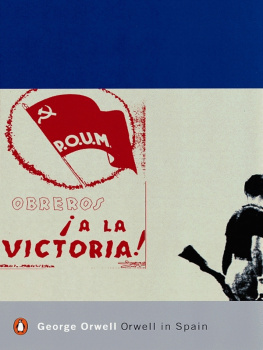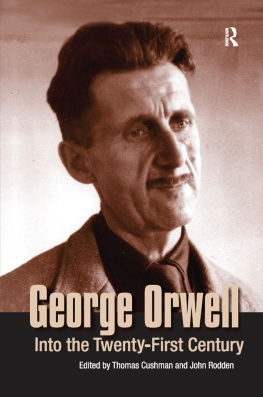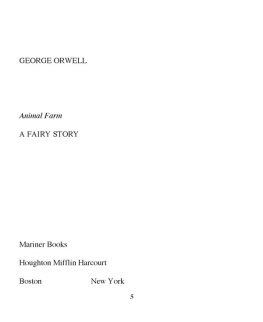
The Complete Works of
GEORGE ORWELL
(19031950)

Contents

Delphi Classics 2013
Version 1

The Complete Works of
GEORGE ORWELL

By Delphi Classics, 2013
COPYRIGHT
Complete Works of George Orwell
First published in the United Kingdom in 2013 by Delphi Classics.
Delphi Classics, 2013.
All rights reserved. No part of this publication may be reproduced, stored in a retrieval system, or transmitted, in any form or by any means, without the prior permission in writing of the publisher, nor be otherwise circulated in any form other than that in which it is published.
Delphi Classics
is an imprint of
Delphi Publishing Ltd
Hastings, East Sussex
United Kingdom
Contact: sales@delphiclassics.com
www.delphiclassics.com
Parts Edition Now Available!

Love reading George Orwell ?
Did you know you can now purchase the Delphi Classics Parts Edition of this author and enjoy all the novels, plays, non-fiction books and other works as individual eBooks? Now, you can select and read individual novels etc. and know precisely where you are in an eBook. You will also be able to manage space better on your eReading devices.

The Parts Edition is only available direct from the Delphi Classics website.
For more information about this exciting new format and to try free Parts Edition downloads , please visit this link .
The Novels

Motihari, Bihar, in North-East India where Eric Blair (known world-wide by his pen name George Orwell) was born. His great-grandfather Charles Blair was a wealthy country gentleman in Dorset who married Lady Mary Fane, daughter of Thomas Fane, 8th Earl of Westmorland, and had income as an absentee landlord of plantations in Jamaica.

Orwell as a baby

Orwell as a young man
BURMESE DAYS

Orwells first novel, Burmese Days, was published by Harper and Brothers in 1934 in the USA. Due to concerns about possible libellous content in the depiction of certain characters, the novel was not published until the following year in the UK. The work is a scathing attack on colonial life in Burma during the British occupation. The novel is centred on John Flory, a thirty five year old teak merchant, who has become disillusioned with colonial life and the attitudes of his fellow Europeans towards Burma and its people. Flory has a great appreciation of Burmese culture and longs to meet a female companion that shares his views and values. When Elizabeth Lackersteen, the orphaned niece of the timber firm manager, arrives on the scene, Flory believes she is the answer to his desires. Elizabeth possesses none of the qualities or values that Flory wishes in a partner and yet he deceives himself, falls in love and pursues her.
Orwell explores the issues of imperialism, racism and the notion of personal identity in Burmese Days . Flory is trapped between his admiration for Burmese culture and dislike of colonial rule, as well as his attachment to English traditions and expectations. He persists in his pursuit of Elizabeth because she fulfils the role of wife that is expected for an English woman and is what society deems a suitable partner for an English gentleman. While Flory is critical of European racism towards the indigenous population, he is content to have a Burmese mistress, but would never consider it appropriate to marry a non- European.
Orwell had spent five years during the 1920s as a police officer in Burma. He had witnessed the nature and impact of imperialism and the horror of the exploitation of the people by colonial rulers. The idea of a minority being dominated and exploited by a ruling class, and the subjugation of the individual in society is a theme that is repeated in Orwells later works. These ideas reach a horrifying conclusion in the dystopian masterpiece Nineteen- Eighty Four . In Burmese Days , Orwell reveals how this oppressive organisation of society benefits no one, the ruled are denied freedom and individuals in the ruling class are encouraged to become dehumanised. It is through this type of environment that identity is lost and atrocities committed.

The title page of the first edition

Orwells police regiment in Burma
CONTENTS

Orwell pictured in a passport photo during his Burma years
Chapter 1
This desert inaccessible
Under the shade of melancholy boughs
As you like it.
U Po Kyin, Sub-divisional Magistrate of Kyauktada, in Upper Burma, was sitting in his veranda. It was only half past eight, but the month was April, and there was a closeness in the air, a threat of the long, stifling midday hours. Occasional faint breaths of wind, seeming cool by contrast, stirred the newly drenched orchids that hung from the eaves. Beyond the orchids one could see the dusty, curved trunk of a palm tree, and then the blazing ultramarine sky. Up in the zenith, so high that it dazzled one to look at them, a few vultures circled without the quiver of a wing.
Unblinking, rather like a great porcelain idol, U Po Kyin gazed out into the fierce sunlight. He was a man of fifty, so fat that for years he had not risen from his chair without help, and yet shapely and even beautiful in his grossness; for the Burmese do not sag and bulge like white men, but grow fat symmetrically, like fruits swelling. His face was vast, yellow and quite unwrinkled, and his eyes were tawny. His feet squat, high-arched feet with the toes all the same length were bare, and so was his cropped head, and he wore one of those vivid Arakanese longyis with green and magenta checks which the Burmese wear on informal occasions. He was chewing betel from a lacquered box on the table, and thinking about his past life.
Next page



























